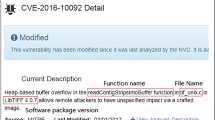Abstract
Detecting vulnerabilities is essential to maintaining software security. At present, vulnerability detection based on deep learning has achieved remarkable results. The type of vulnerability could tell the vulnerability principles and help the programmer quickly pinpoint the precise location of vulnerabilities. Moreover, the type of vulnerability is very valuable for remediating it. Therefore, it is essential to identify vulnerability types. This paper proposes a new vulnerability type identification framework based on deep learning. The framework is based on syntax and semantics, and the detection granularity is fine to the slice level. To include comprehensive vulnerability types, we use four slicing methods to represent the program. In addition, we model four kinds of code slice features based on BERT. For evaluation, we used 64 three-level CWE-IDs vulnerability types in National Vulnerability Database (NVD) and Software Assurance Reference Dataset (SARD) for vulnerability type identification. The experimental results show that it has significant performance in vulnerability type identification.
Access this chapter
Tax calculation will be finalised at checkout
Purchases are for personal use only
Similar content being viewed by others
References
Lin, G., Wen, S., Han, Q.L., Zhang, J., Xiang, Y.: Software vulnerability detection using deep neural networks: a survey. In: Proceedings of the IEEE, vol. 99, pp. 1–24 (2020)
Ghaffarian, S.M., Shahriari, H.R.: Software vulnerability analysis and discovery using machine-learning and data-mining techniques. ACM Comput. Surv. (CSUR) 50(4), 1–36 (2017)
Yamaguchi, F., Wressnegger, C., Gascon, H., Rieck, K.: Chucky: exposing missing checks in source code for vulnerability discovery. In: ACM Conference on Computer and Communications Security (2013)
Grieco, G., Grinblat, G.L., Uzal, L., Rawat, S., Feist, J., Mounier, L.: Toward large-scale vulnerability discovery using machine learning. In: ACM (2016)
Zhen, L., Zou, D., Xu, S., Ou, X., Zhong, Y.: Vuldeepecker: a deep learning-based system for vulnerability detection. In: Network and Distributed System Security Symposium (2018)
Zou, D., Wang, S., Xu, S., Li, Z., Jin, H.: \(\mu \)VulDeePecker: a deep learning-based system for multiclass vulnerability detection. arXiv e-prints (2020)
Lin, G., Zhang, J., Wei, J., Lei, L., Yang, P., Xiang, Y.: Cross-project transfer representation learning for vulnerable function discovery. IEEE Trans. Indust. Inform. 14, 3289–3297 (2018)
Liu, S., et al.: CD-VULD: Cross-domain vulnerability discovery based on deep domain adaptation. IEEE Trans. Depend. Sec. Comput. vol. 99, p. 1 (2020)
Li, Z., Zou, D., Xu, S., Jin, H., Chen, Z.: SySeVR: a framework for using deep learning to detect software vulnerabilities. IEEE Trans. Depend. Sec. Comput. 99, 1 (2021)
Schuster, M., Nakajima, K.: Japanese and Korean voice search. In: 2012 IEEE International Conference on Acoustics, Speech and Signal Processing (ICASSP) (2012)
Yamaguchi, F., Golde, N., Arp, D., Rieck, K.: Modeling and discovering vulnerabilities with code property graphs. In: IEEE Symposium on Security and Privacy (2014)
Devlin, J., Chang, M.W., Lee, K., Toutanova, K.: BERT: pre-training of deep bidirectional transformers for language understanding (2018)
Li, X., Gao, W., Feng, S., Zhang, Y., Wang, D.: Boundary detection with BERT for span-level emotion cause analysis. In: Findings of the Association for Computational Linguistics: ACL-IJCNLP 2021 (2021)
Padmanabhuni, B.M., Tan, H.: Buffer overflow vulnerability prediction from \(\times \)86 executables using static analysis and machine learning. In: Computer Software and Applications Conference 2015, pp. 450–459 (2015)
Li, Z., et al.: VulDeePecker: a deep learning-based system for vulnerability detection. arXiv preprint arXiv:1801.01681 (2018)
Acknowledgements
This work is partially supported by the National Natural Science Foundation of China (No. 62172407), and the Youth Innovation Promotion Association CAS.
Author information
Authors and Affiliations
Corresponding author
Editor information
Editors and Affiliations
Rights and permissions
Copyright information
© 2022 The Author(s), under exclusive license to Springer Nature Switzerland AG
About this paper
Cite this paper
Zhu, C., Du, G., Wu, T., Cui, N., Chen, L., Shi, G. (2022). BERT-Based Vulnerability Type Identification with Effective Program Representation. In: Wang, L., Segal, M., Chen, J., Qiu, T. (eds) Wireless Algorithms, Systems, and Applications. WASA 2022. Lecture Notes in Computer Science, vol 13471. Springer, Cham. https://doi.org/10.1007/978-3-031-19208-1_23
Download citation
DOI: https://doi.org/10.1007/978-3-031-19208-1_23
Published:
Publisher Name: Springer, Cham
Print ISBN: 978-3-031-19207-4
Online ISBN: 978-3-031-19208-1
eBook Packages: Computer ScienceComputer Science (R0)




